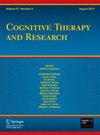通过进食障碍特异性反射观察身体偏见判断加工对进食障碍症状的间接影响
IF 2
3区 心理学
Q2 PSYCHOLOGY, CLINICAL
引用次数: 0
摘要
摘要背景本研究旨在实证评估体型和体重判断偏差、ED特异性反刍亚型(即ED特异性反射和ED特异性沉思)和饮食失调(ED)症状之间的关系。方法344名17-24岁的女大学生完成ED特异性反刍和ED症状自述测试,并设计了一项评估身体偏见判断加工的新任务。结果结果显示,根据体型和体重判断身体的偏见与ED症状有间接而非直接的关系。具体来说,有偏见的判断加工通过ED特异性反刍反射与ED症状间接相关,但不通过ED特异性反刍沉思。结论目前的研究结果表明,身体的偏见判断加工可能通过ED特异性反刍反射导致ED症状。值得注意的是,间接影响很小,这表明在这种关系中涉及其他潜在变量。因此,有必要进一步探索偏见判断加工与ED症状之间关系的认知因素。本文章由计算机程序翻译,如有差异,请以英文原文为准。

The Indirect Effect of Biased Judgment Processing of Bodies on Eating Disorder Symptomatology Through Eating Disorder-Specific Reflection
Abstract Background The current study sought to empirically evaluate the relationships between biases involving judgment of bodies in terms of their shape and weight, ED-specific rumination subtypes (i.e., ED-specific reflection and ED-specific brooding) and eating disorder (ED) symptomatology. Methods Female undergraduates ( n = 344) aged 17–24 years completed self-report measures of ED-specific rumination and ED symptomatology and a novel task designed to assess biased judgement processing of bodies. Results Results revealed that a bias in judging bodies in terms of their shape and weight was indirectly but not directly associated with ED symptomatology. Specifically, biased judgement processing was indirectly associated with ED symptomatology via ED-specific ruminative reflection but not via ED-specific ruminative brooding. Conclusions The current findings suggest biased judgement processing of bodies may contribute to ED symptomatology via ED-specific ruminative reflection. It is important to note that the indirect effect was small suggesting the involvement of other potential variables in this relationship. Thus, further exploration of the cognitive factors involved in the relationship between biased judgement processing and ED symptomatology is warranted.
求助全文
通过发布文献求助,成功后即可免费获取论文全文。
去求助
来源期刊

Cognitive Therapy and Research
PSYCHOLOGY, CLINICAL-
CiteScore
5.30
自引率
0.00%
发文量
52
期刊介绍:
Cognitive Therapy and Research (COTR) focuses on the investigation of cognitive processes in human adaptation and adjustment and cognitive behavioral therapy (CBT). It is an interdisciplinary journal welcoming submissions from diverse areas of psychology, including cognitive, clinical, developmental, experimental, personality, social, learning, affective neuroscience, emotion research, therapy mechanism, and pharmacotherapy.
 求助内容:
求助内容: 应助结果提醒方式:
应助结果提醒方式:


